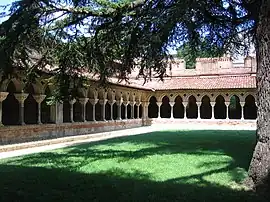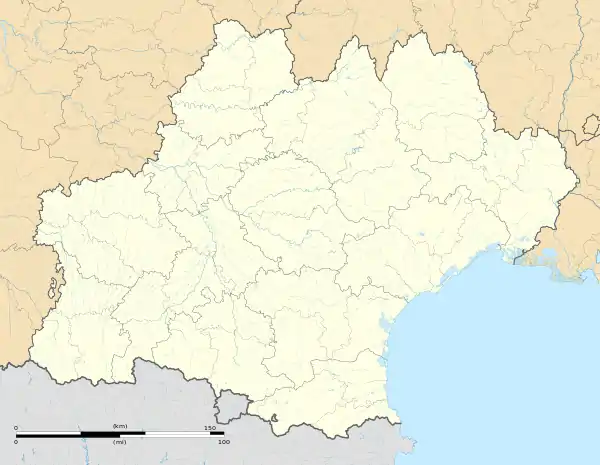Moissac | |
|---|---|
 Cloister of the Saint-Pierre abbey | |
 Coat of arms | |
Location of Moissac | |
 Moissac  Moissac | |
| Coordinates: 44°06′20″N 1°05′10″E / 44.1056°N 1.0861°E | |
| Country | France |
| Region | Occitania |
| Department | Tarn-et-Garonne |
| Arrondissement | Castelsarrasin |
| Canton | Moissac |
| Government | |
| • Mayor (2020–2026) | Romain Lopez[1] (RN) |
| Area 1 | 85.95 km2 (33.19 sq mi) |
| Population | 13,748 |
| • Density | 160/km2 (410/sq mi) |
| Time zone | UTC+01:00 (CET) |
| • Summer (DST) | UTC+02:00 (CEST) |
| INSEE/Postal code | 82112 /82200 |
| Elevation | 59–199 m (194–653 ft) (avg. 76 m or 249 ft) |
| 1 French Land Register data, which excludes lakes, ponds, glaciers > 1 km2 (0.386 sq mi or 247 acres) and river estuaries. | |
Moissac (French pronunciation: [mwasak]) is a commune in the Tarn-et-Garonne department in the Occitanie region in southern France. The town is situated at the confluence of the rivers Garonne and Tarn at the Canal de Garonne. Route nationale N113 was constructed through the town and between Valence-d'Agen and Castelsarrasin. It is served by Moissac station on the Bordeaux-Toulouse line.
History
Initially Moissac was part of the department of Lot. In 1808, Napoleon decreed the city be attached to the new department of Tarn-et-Garonne.[3] It was the chief town of the district from 1800 to 1926.
Moissac was heavily damaged in March 1930 by flooding of the Tarn, which devastated much of southwestern France. It was counted as a 100-year flood. One hundred twenty people were reported to have died in the city.[4]
In 2020, National Rally politician Romain Lopez was elected mayor.[5][6][7]
Moissac Abbey
Moissac is known internationally for the artistic heritage preserved in the medieval Moissac Abbey. This church is a site on the World Heritage Site Routes of Santiago de Compostela in France.
Saint-Pierre Church, former abbey church with the portal (1130), one of the masterpieces of Romanesque sculpture. All that remains of the 11th century building is the massive bell tower-porch, a sort of keep with a walkway, built for defensive purposes but whose top floor only dates from the end of the Gothic period.
Sights
- Church of Saint-Martin de Moissac. Parts of the church date from the 3rd century.[8] The church has preserved paintings from the XIVth century. The church was classified as a historic monument in 1922.[9]
- Church of Saint-Michel de Moissac. The old Saint-Michel de Moissac church located at 49 rue Malaveille, mentioned in 1073, but its origin can be older.
Population
| Year | Pop. | ±% p.a. |
|---|---|---|
| 1968 | 11,856 | — |
| 1975 | 11,826 | −0.04% |
| 1982 | 11,184 | −0.79% |
| 1990 | 11,971 | +0.85% |
| 1999 | 12,321 | +0.32% |
| 2007 | 12,377 | +0.06% |
| 2012 | 12,470 | +0.15% |
| 2017 | 13,039 | +0.90% |
| Source: INSEE[10] | ||
Waterways

There are important waterways in Moissac: the Tarn flows through the centre of town, as does the Canal de Garonne (formerly Canal latéral à la Garonne), the extension of the Canal du Midi from Toulouse to Bordeaux. Together, these two canals are sometimes known as the Canal des deux mers (lit. canal of the two seas) connecting the Atlantic Ocean with the Mediterranean Sea.
Twin towns
See also
References
- ↑ "Répertoire national des élus: les maires" (in French). data.gouv.fr, Plateforme ouverte des données publiques françaises. 6 June 2023.
- ↑ "Populations légales 2021". The National Institute of Statistics and Economic Studies. 28 December 2023.
- ↑ 'Naissance du département de Tarn-et-Garonne' at Archived 2008-12-04 at the Wayback Machine
- ↑ Max Lagarrigue,"L’inondation du siècle, mars 1930", in "Les Caprices du Temps," revue Arkheia, n°21, Montauban, 2009.
- ↑ "Romain Lopez : qui est ce proche de Marion Maréchal élu maire de Moissac ?" (in French). 29 June 2020.
- ↑ A young RN candidate becomes the mayor of Moissac, Teller Report
- ↑ "French town that saved Jews elects mayor from party founded by Holocaust denier". The Times of Israel.
- ↑ Bastien Lefebvre, Moissac, ancienne église Saint-Martin, p. 319-322, Congrès archéologique de France. 170e session. Monuments de Tarn-et-Garonne. 2012, Société française d'archéologie, Paris, 2014.
- ↑ Eglise Saint-Martin. Ministere de la Culture France.
- ↑ Population en historique depuis 1968, INSEE